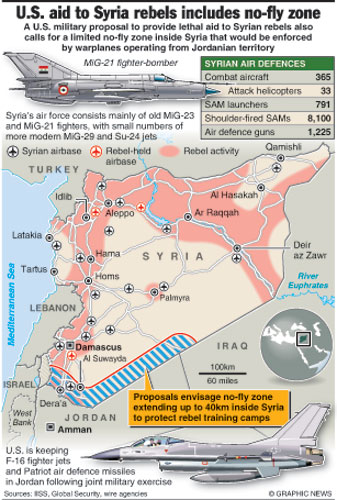Sunday Times 2
US considers no-fly zone after Syria crosses ‘red line’
View(s):ANKARA/BEIRUT, June 15, (Reuters) – The United States is considering a no-fly zone in Syria as it weighs options for intervention into the 2-year-old civil war, Western diplomats said on Friday, after the White House said Syria had crossed a “red line” by using nerve gas.
After months of deliberation, President Barack Obama’s administration said on Thursday it would now arm rebels, having obtained proof the Syrian government used chemical weapons against fighters trying to overthrow President Bashar al-Assad.
Two senior Western diplomats said the United States was looking into a limited no-fly zone close to Syria’s southern border with Jordan.

A Syrian rebel fighter carries a homemade rocket to be launched towards a military airport controlled by Syrian troops. Reuters
“Washington is considering a no-fly zone to help Assad’s opponents,” one diplomat said. Imposing a no-fly zone could require the United States to destroy Syria’s sophisticated Russian-built air defences, thrusting it into the war with the sort of action NATO used to help topple Muammar Gaddafi in Libya two years ago.
Washington says it has not excluded a no fly zone but is also considering other options. “We have been clear that we are not excluding options but at this stage no decision has been taken,” said Susan Rice, the U.S. ambassador to the United Nations and Obama’s incoming national security adviser.
“A no-fly zone … would carry with it great and open-ended costs for the United States and the international community. It’s far more complex to undertake the type of effort, for instance, in Syria than it was in Libya,” U.S. deputy national security adviser Ben Rhodes said on Thursday.
Any such move would also come up against a potential veto from Assad ally Russia in the U.N. Security Council. The Kremlin dismissed U.S. evidence of Assad’s use of nerve gas. “I will say frankly that what was presented to us by the Americans does not look convincing,” President Vladimir Putin’s senior foreign policy advisor Yuri Ushakov said.
In a letter to the United Nations secretary general, Rice said the Syrian government had used chemical weapons in four attacks between March and May. Rice provided the dates and locations for the attacks and said sarin was used in two of the attacks in areas close to Aleppo in March and April. Unspecified chemicals were used in the other attacks in May, she said.
The commander of Syria’s main rebel fighting force urged Western allies to supply anti-aircraft and anti-tank missiles and to create a no-fly zone, saying if properly armed he could defeat Assad’s army within six months. Free Syrian Army commander Salim Idriss told Reuters his forces urgently needed heavier weapons in the northern city of Aleppo, where Assad’s government has said its troops are preparing a massive assault.

“If we have done the training … and have enough weapons and ammunition I think it will be a matter of time, about six months, maybe less, maybe more, to collapse the regime.” France said a no-fly zone would be impossible without U.N. Security Council authorisation, which made it unlikely for now.
Nevertheless, Washington has quietly taken steps that would make it easier, moving Patriot surface-to-air missiles, war planes and more than 4,000 troops into Jordan, officially as part of an annual exercise in the past week but making clear that the assets could stay on when the war games are over.
MOMENTUM TURNS
Syria’s civil war grew out of protests that swept across the Arab world in 2011, becoming by far the deadliest of those uprisings and the most difficult to resolve, with powers across the Middle East squaring off on sectarian lines.
Western countries have spent the past two years demanding Assad leave power but declining to use force as they did in Libya, because of the far greater risk of fighting a much stronger country that straddles sectarian divides at the heart of the Middle East and is backed by Iran and Russia.
Just months ago, Western countries believed Assad’s days were numbered. But momentum on the battlefield has turned in his favour, making the prospect of his swift removal and an end to the bloodshed appears remote without outside intervention. Thousands of fighters from Lebanon’s pro-Iranian Hezbollah militia have joined the war on Assad’s behalf and last week helped the Syrian government recapture Qusair, a strategic town.
Assad’s government says its troops are now preparing for an assault on Aleppo, mainly in rebel hands since last year. Activists reported an intensified assault on parts of Aleppo and its countryside near the Turkish border overnight, sparking some of the most violent clashes in months.
Follow @timesonlinelk
comments powered by Disqus

